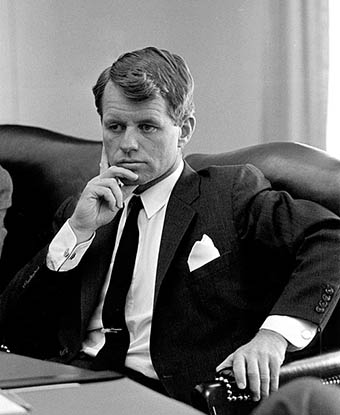Last updated: November 17, 2025
Person
Robert F. Kennedy

Robert Francis Kennedy was the seventh child in the closely knit and competitive family of Rose and Joseph P. Kennedy. He attended Milton Academy and, after wartime service in the Navy, received his degree in government from Harvard University in 1948. He earned his law degree from the University of Virginia Law School three years later. On June 17, 1950, Robert Kennedy married Ethel Skakel. Robert and Ethel Kennedy later had eleven children. In 1952, he made his political debut as manager of his older brother John's successful campaign for the U.S. Senate from Massachusetts. The following year, he served briefly on the staff of the Senate Subcommittee on Investigations, chaired by Senator Joseph McCarthy. Disturbed by McCarthy's controversial tactics, Kennedy resigned from the staff after six months.
In 1960 he was the tireless and effective manager of John's presidential campaign. After the election, he was appointed Attorney General in President Kennedy's Cabinet. While Attorney General he won respect for his diligent, effective and nonpartisan administration of the Department of Justice. Attorney General Kennedy became increasingly committed to the rights of African Americans to vote, receive an equal education, and use public accommodations. He was not only President Kennedy's Attorney General, he was also his closest advisor and confidant. As a result of this unique relationship, the Attorney General played a key role in several critical foreign policy decisions.
Soon after President Kennedy's death, Robert Kennedy resigned as Attorney General and, in 1964, ran successfully for the United States Senate from New York. Kennedy waged an effective statewide campaign and, aided by President Lyndon Johnson's landslide, won the November election by 719,000 votes. As Senator, Kennedy helped initiate programs that were part of a larger effort to address the needs of the dispossessed and powerless in America - the poor, the young, racial minorities and Native Americans. He sought to bring the facts about poverty to the conscience of the American people, journeying into urban ghettos, Appalachia, the Mississippi Delta and migrant workers' camps. Kennedy was also committed to the advancement of human rights abroad, and was also absorbed during his Senate years by a quest to end the war in Vietnam.
On March 16, 1968, Robert Kennedy announced his candidacy for the Democratic presidential nomination. In this campaign he challenged the complacent in American society and sought to bridge the great divides in American life - between the races, between the poor and the more affluent, between young and old, between order and dissent. He won critical primaries in Indiana and Nebraska and spoke to enthusiastic crowds across the nation.
Robert Francis Kennedy was shot on June 5, 1968, at the Ambassador Hotel in Los Angeles, California shortly after claiming victory in that state's crucial Democratic primary. He died in the early hours of June 6, 1968 at the age of 42.
